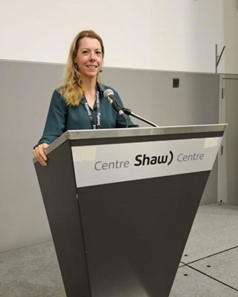Research into early detection of impairments in hearing and vision in young children launched
As of 1 March, Saskia Damen has started a new study on the early detection of deafblindness in young children. Deafblindness refers to a condition involving both hearing and vision impairments. Damen is a senior researcher at the Kentalis Academy and professor by special appointment in Orthopedagogy at the Faculty of Behavioural and Social Sciences at the University of Groningen.

Impaired hearing and impaired vision
Damen: ‘In 2005, a study by Meuwese-Jongejeugd revealed that 5% of people with an intellectual disability in the Netherlands had both hearing and vision problems. In 88% of these cases, this was previously unknown. That alone highlights the importance of our research. From 1 March, we will investigate which factors hinder and facilitate the early detection of young children (0-5 years) with hearing and vision impairments (deafblindness). We will also examine which factors obstruct or promote their referral to specialised early intervention programmes and their admission to these programmes. Additionally, we will explore promising methods to improve early detection, referral, and admission, assessing which of these methods are most feasible for implementation in the Netherlands. We will also draw on research findings and best practices from other countries to see how they can be applied in the Dutch context."
A global challenge
Damen has been reflecting on the issue of late recognition of deafblindness worldwide for many years. ‘Even in the Netherlands, we still see young people and adults whose deafblindness has not been identified. As a result, they do not receive the appropriate care or education. Some young people or adults, for instance, end up in institutions for individuals with intellectual disabilities—environments where they do not receive the tailored support they need. This includes an adapted communication system. When sensory impairments are later investigated in such an institution, and experts in the field are consulted, it often turns out that there are individuals with deafblindness who could learn tactile signing (where signs are felt with the hands). We then see that communication does indeed develop, even at a later age.’
Preventing unnecessary developmental delays
The findings from Damen’s research aim to prevent avoidable developmental delays in all areas of life. This includes sensory deprivation (a lack of sensory experiences), social isolation, and emotional and behavioural issues. The research outcomes may also help reduce stress and uncertainty for parents, caregivers, and teachers. ‘Tailored support is essential for individuals with deafblindness. The European Parliament also recognises this as a right for every individual with hearing and vision impairments.’
What results do you expect to achieve?
‘In this project, we are examining the factors that can help ensure as many children with hearing and vision impairments as possible receive the right and appropriate form of care and educational support. We believe that early detection, referral, and guidance for this group must improve in the Netherlands. Through our research, we will develop a concrete action plan for this. Furthermore, we expect that the knowledge we gain and the action plan we create will also be relevant for other countries."
Collaboration Partners
Damen collaborates within an Intervention Mapping (IM) working group, consisting of representatives from multiple partner organisations. IM is a process designed to systematically assess and address healthcare challenges using theoretical and practical evidence (Durk et al., 2017).
In addition to Kentalis and the University of Groningen, the partners include the Dutch Centre for Youth Healthcare (NCJ), the Public Health Service of Groningen (GGD Groningen), the University Medical Center Groningen’s rehabilitation department (UMCG), Pento, Milo, Royal Visio, and AJN, a platform for youth doctors in the Netherlands. The working group receives supervision from Professor Rob Ruiter (Maastricht University).
This research project is funded by ZonMW as part of the ‘Expertise function for sensory disabilities’ programme.
More Information
-
Read the full interview with Saskia Damen on the Kentalis website
| Last modified: | 19 March 2025 4.05 p.m. |
More news
-
17 March 2025
Liekuut | The high price of conflicts
According to Carsten de Dreu, Professor of Foundations of Cooperation and Social Organization at the University of Groningen, a lot can be learned from conflicts.
-
10 March 2025
Science for Society | Memory Lab for higher marks
Learning facts at school is something hardly anyone likes. The day before a test, pupils cram as many words or names as possible into their heads, only to hopefully remember them the next morning and then forget them again after the test.
-
05 March 2025
Women in Science
The UG celebrates International Women’s Day with a special photo series: Women in Science.


